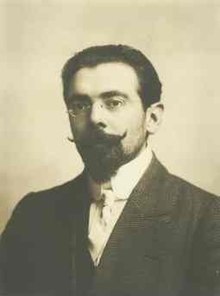Antonio Maria da Silva
António Maria da Silva (born May 26, 1872 in Lisbon , † October 14, 1950 ibid) was a prominent politician in Portugal during the first republic . He was head of government four times in his country.
Life
Da Silva studied mining at the Army School ( Colégio do Exército ). He campaigned for the republic during the monarchy and therefore had to spend a year in exile in Spain . After the abolition of the monarchy, he was initially temporarily director general of the statistical office and general administrator of the Portuguese post office.
A loyal supporter of Afonso Costa and his Democratic Party , of which da Silva was briefly chairman during Afonso Costa's exile in Paris , he held important political posts throughout the period of the First Republic. He was a member of the Constituent Assembly elected after the abolition of the monarchy in 1911. Later he was Minister of Education in the first government of Afonso Costa (1913-1914).
On January 25, 1915 , General Joaquim Pimenta de Castro launched a coup against the government. He let the parliament dissolved and ruled dictatorially ("dictatorship of swords" - ditatura das espadas ). On May 14, 1915, de Castro was overthrown by another coup. A so-called constitutional junta, to which da Silva also belonged, took power, handing over power to the new Prime Minister José de Castro after four days . A short time later Afonso Costa was again prime minister and da Costa took over the office of education minister again (1915-1916).
During the First World War , a grand coalition was formed in Portugal, the so-called government of sacred unity ( governo da união sagrada ) under António José de Almeida , who belonged to da Silva as labor minister. He was briefly a member of the cabinet of Alfredo de Sá Cardoso as finance minister . From June 26 to July 19, 1920 da Silva was Prime Minister himself for the first time. Da Silva's second term lasted from February 7, 1922 to November 15, 1923. During this time, he also held the office of Minister of the Interior . During this second term of office, Manuel Teixeira Gomes was elected President of Portugal (October 6, 1923). Da Silva began a political campaign against the new president, which he carried out with great severity. From July 1 to August 1, 1925, da Silva became Prime Minister for the third time, this time combining the office with the office of Minister of War . He continued his campaign against President Teixeira Gomes, which eventually led to his resignation on December 11, 1925. From December 18, 1925 to May 30, 1926 he became head of government (and interior minister) for the fourth time, the last of the first republic. On May 28, 1926, a putsch ended the first republic, and da Silva resigned two days later.
| predecessor | Office | successor |
|---|---|---|
| Joaquim Pimenta de Castro |
Prime Minister of Portugal ( constitutional junta: together with: José Norton de Matos Alfredo de Sá Cardoso José de Freitas Ribeiro Álvaro de Castro ) 1915 |
José de Castro |
| predecessor | Office | successor |
|---|---|---|
| José Ramos Preto |
Prime Minister of Portugal 1920 |
António Joaquim Granjo |
| predecessor | Office | successor |
|---|---|---|
| Francisco Pinto da Cunha Leal |
Prime Minister of Portugal 1922–1923 |
António Ginestal Machado |
| predecessor | Office | successor |
|---|---|---|
| Vitorino de Carvalho Guimarães |
Prime Minister of Portugal 1925 |
Domingos Leite Pereira |
| predecessor | Office | successor |
|---|---|---|
| Domingos Leite Pereira |
Prime Minister of Portugal 1925–1926 |
José Mendes Cabeçadas Júnior |
| personal data | |
|---|---|
| SURNAME | Silva, António Maria da |
| BRIEF DESCRIPTION | Portuguese politician |
| DATE OF BIRTH | May 26, 1872 |
| PLACE OF BIRTH | Lisbon |
| DATE OF DEATH | October 14, 1950 |
| Place of death | Lisbon |

